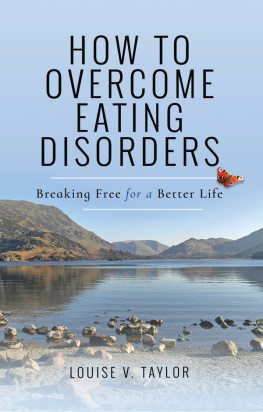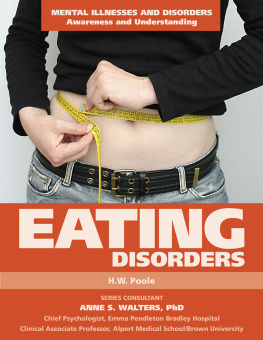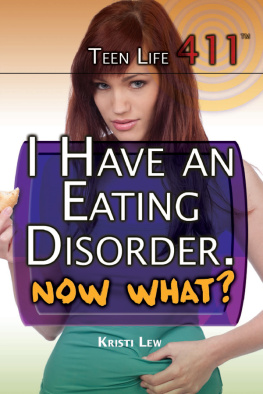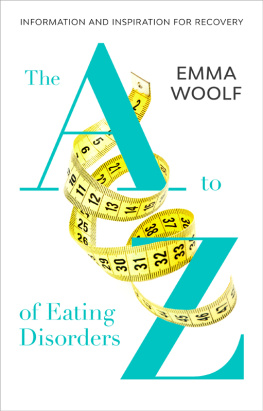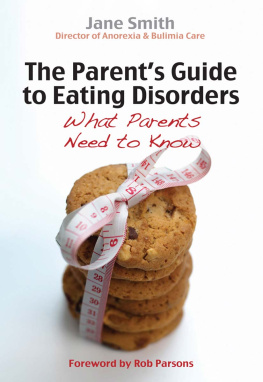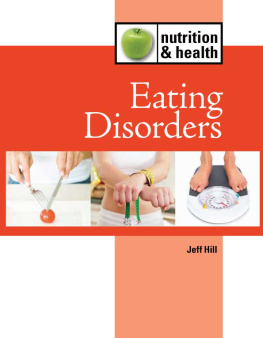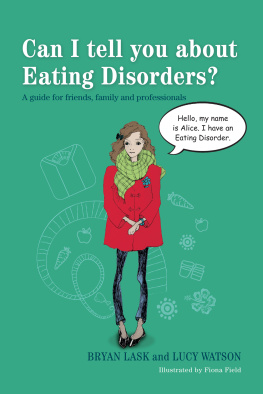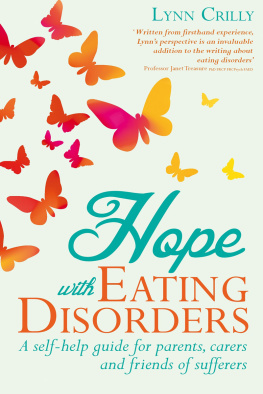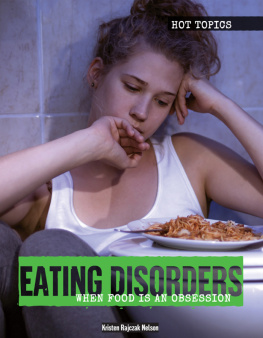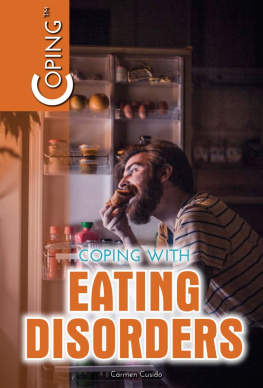
How to Overcome Eating Disorders
How to Overcome Eating Disorders
Breaking Free for a Better Life
Louise V Taylor
First published in Great Britain in 2017 by
Pen & Sword White Owl
an imprint of
Pen & Sword Books Ltd
47 Church Street
Barnsley
South Yorkshire
S70 2AS
Copyright Louise V Taylor 2017
ISBN 978 1 47389 504 1
eISBN 978 1 47389 506 5
Mobi ISBN 978 1 47389 505 8
The right of Louise V Taylor to be identified as the Author of this Work has been asserted by her in accordance with the Copyright, Designs and Patents Act 1988.
A CIP catalogue record for this book is available from the British Library
All rights reserved. No part of this book may be reproduced or transmitted in any form or by any means, electronic or mechanical including photocopying, recording or by any information storage and retrieval system, without permission from the Publisher in writing.
Pen & Sword Books Ltd incorporates the imprints of Pen & Sword Archaeology, Atlas, Aviation, Battleground, Discovery, Family History, History, Maritime, Military, Naval, Politics, Railways, Select, Transport, True Crime, Fiction, Frontline Books, Leo Cooper, Praetorian Press, Seaforth Publishing and Wharncliffe.
For a complete list of Pen & Sword titles please contact
PEN & SWORD BOOKS LIMITED
47 Church Street, Barnsley, South Yorkshire, S70 2AS, England
E-mail:
Website: www.pen-and-sword.co.uk
Chapter 1
Introduction
E ating disorders are a growing problem in the western world, where theres a culture of individualism and considerable emphasis on the importance of appearance. In developing countries, where food shortages and famine are more common, eating disorders are very rare. So is it our culture thats to blame? Where people starve in a land of plenty?
Thats certainly part of the story, but eating disorders actually go much deeper than concerns about body image. Theyre a sign of inner turmoil, emotional struggles, and its often said that by controlling their bodies, sufferers feel more in control of their lives. The illness may be an expression of repressed inner pain that has been bottling up for years.
So why is the problem growing and what can we do about it? This book sets out to explore different theories, scientific studies and real life experiences relating to eating disorders. The aim is to offer information, comfort and support to those affected by eating disorders and to assist sufferers on the road to recovery.
While eating disorders have been around for decades, in recent years they have become increasingly common, seeing a 15 per cent rise between the years 2000 and 2009. They affect people of all ages, and from all backgrounds.
A survey published in the International Journal of Eating Disorders in 2012, found symptoms of eating disorders in 13 per cent of women over the age of 50. So although the disorders are more common among young people, theyre certainly not the only group affected. Indeed, young children are increasingly developing eating disorders as they feel the pressure to meet a Western ideal of beauty. Theres also been a surge in the number of men succumbing to eating disorders. The shame of the disease keeps it hidden from society and can make getting accurate data difficult. Its a secretive illness and often, sufferers are afraid of being judged, so theyre reluctant to reveal the truth about their condition.
In 2015, the eating disorder charity, Beat, commissioned research by Pricewaterhouse Cooper, which concluded that 725,000 people in the UK are affected by eating disorders. In 2007, NHS researchers stated that up to 6.4 per cent of adults showed signs of having an eating disorder, and that up to 25 per cent of these people were male. Eating disorder related hospital admissions rose 8 per cent in 2014 compared to the previous year. Its clearly a big problem.
The causes of the eating disorder epidemic are many and varied, but underlying issues typically include severe self-esteem issues, depression, loneliness, and a longing to fit in and be accepted by our peers.
Our modern society can feel like a cold and uncaring place. People can be unduly critical, judgemental and unkind, offering ridicule rather than help, belittlement rather than direction. Being on the receiving end of endless criticism can erode your sense of self-worth; its not always easy to walk away.
Furthermore, having a vocation is important, so if you cant find work, fulfilling hobbies, or another meaningful occupation, the long empty days, possibly accompanied by countless rejection letters from employers, can erode your self-esteem. Some individuals just dont feel valued.
Its also common for people to feel stressed or overwhelmed by the pace of modern life. Everyones so busy. You might get carried along, or left behind. Either way, some individuals feel that their life is out of control. They might have emotional problems and feel there is no-one they can turn to. Controlling their body gives them some semblance of control over their lives, and might provide an emotional lift a sense of achievement.
Its common for young people to experience a longing to be socially accepted if theyve been bullied, abused, or treated like an outcast for years. Body image is often the first line of defence if we feel under attack, are called nasty names and told we need to try harder to fit in.
A background of bullying, abuse or neglect is common among people with eating disorders. Everyone needs to feel valued, feel that they are worth something, accepted by society and appreciated occasionally. Sufferers might feel torn apart by unrequited love, crushed by bullies, or just feel empty, lonely, unfulfilled and unable to change their circumstances. The range of underlying emotions and difficulties can be diverse and wide-ranging.
In an ideal world, our happiness should not depend on the love or approval of other people. But the world is not ideal and, in reality, most people would agree that they need to feel valued by someone else. So when this need is unmet, some individuals are prepared to go to extreme lengths in pursuit of peer approval, self-worth, societys acceptance, or good old-fashioned love. In an environment where body image is valued so highly, this often plays out as an obsession with appearance. In reality, its often in pursuit of a higher goal: happiness.
Anorexia and bulimia are often triggered by attempts at slimming, to meet societys ideals. Individuals are then driven to continue by that glowing sense of achievement, pride and social acknowledgement that you get from success. Society loves people who take pride in their appearance and puts them on pedestals. Slimmers of the Year are looked up to as inspirational role models. Books on slimming are best sellers all year round. There are dozens of fad diets. Magazines are constantly promoting weight-loss. Its a billion dollar industry worldwide.
Its true that if youre overweight then slimming can be good for your health, but only if it results in healthy lifestyle changes, permanently. Yoyo diets can actually cause an increase in weight and theyre demoralising. Yoyo dieting is a destructive pattern that many slimmers get into, and it can lead to bulimia nervosa, an overwhelming compulsion to binge and purge, disposing of the food youve eaten.
Once slimming becomes an obsession, it takes on a whole new life of its own. It can be emotionally rewarding on many levels not just the sense of achievement, but by reducing your internal conflicts about being good enough, lovable and attractive. Fast and dramatic weight loss can numb inner pain and an obsessive focus on food can make the causes of angst and unhappiness seem less important. When youre starving, you become anaesthetised to emotional pain. The strength of feelings fades quickly, making you less vulnerable to being hurt. Your sex drive fades away and your need for companionship lessens, so you start to feel better if your social needs are unmet. It doesnt matter any more. You feel more independent.
Next page
